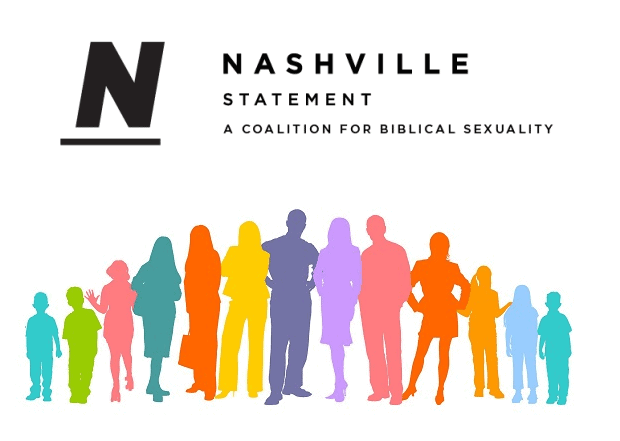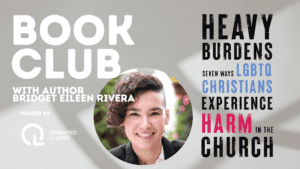 Here are some practical applications for pushing back against the harm of the Nashville Statement and taking collective action toward justice. Just for fun, I will use “The Statement’s” format to present my ideas for a collective—and active—rebuttal.
Here are some practical applications for pushing back against the harm of the Nashville Statement and taking collective action toward justice. Just for fun, I will use “The Statement’s” format to present my ideas for a collective—and active—rebuttal.
ARTICLE 1
WE COMMIT to pray for the justice which we seek. We will pray without ceasing for the Kingdom we dream of and see declared in Scripture WHILE ALSO acting on God’s invitation to help tangibly bring about that Kingdom on Earth. We acknowledge that action without prayer is not possible because true change comes from the power of God’s creative imagination guiding and transforming us.
WE DENY that prayer is the only answer and reject the use of prayer to excuse the church from action. We also deny the use of prayer to silence souls who are crying out against injustice. Silencing pain is not of God.
ARTICLE 2
WE AFFIRM the need for allies on both sides of the theological debate to seek quality information that goes beyond one-sided views, stepping out of our echo chambers to build bridges. We commit to spend time learning about the lived experience of LGBTQAI+ Christians through reading and through intimate conversations with those willing and ready to teach us. We will seek Godly sources as well as wisdom from multiple disciplines recognizing that God works in and through many intellectual avenues to point back to the heart of God. Allies openly admit that too often we talk from a place of expertise on these issues, even though we will never truly know the experience of our LGBT+ brothers, sisters, and non-binary family members. We apologize and will continue to apologize when we find we have erred in working with you. We WILL continue to learn in humility and accept feedback and the leadership of LGBT+ Christians in this journey. (See possible resources below.)
WE DENY that learning alone will bring change, but we recognize that we can offer our best to this situation when we are well- trained and informed. Allies DENY any place at the helm of this struggle for LGBT+ justice and inclusion in the church, and instead empower our LGBT+ friends to leadership. Allies will give our full support, our connections, and our platforms to LGBT+ Christian friends, coming alongside LGBT+ Christians with resources for the work of change.
ARTICLE 3
WE AFFIRM the incarnation of Love in the person of Jesus, and we commit to follow that embodied model as we learn to love God, ourselves, and our neighbor. We will love—actively and always. We trust the Holy Spirit to lead us and correct us, believing God can uphold Love despite human confusion and failures. We trust Scripture that says we will know God based on fruit, so we will work towards a Church that will allow LGBT+ Christians to experience the fruit of love, joy, peace, patience, kindness, goodness, faithfulness, gentleness, and self-control. Specifically, we will build this Church by listening, asking questions, embarrassing ourselves, and inconveniencing ourselves to show up for the needs of others. We will risk losing our social status, our friends, our employment, and if needed, we will give up our good-standing in the Church to be with LGBT+ friends who are made to feel unwelcome. We will peacefully, firmly, and bravely address the things in our church systems and in our everyday conversations that lead to micro and macro-aggressions against LGBT+ individuals. We will not allow LGBTQAI+ friends, family members and friends to be forgotten, ignored, left out, or diminished from their God-given position as beloved children of God.
WE DENY that Christianity is only about “right ideas” and “right behavior.” Instead, we view the Christian faith as the complex embodiment of God’s justice AND grace, which is beyond human comprehension. We deny that Christianity can only be learned as an intellectual pursuit and claim that it best learned through living out our theology of baptism, communion, and loving service. We believe that “liturgy is both a heart and mind strategy” (see James K. A. Smith’s Desiring the Kingdom: Worship, Worldview, and Cultural Formation) needed for transformation and deny that true transformation can come to the Church or to individuals through perfecting doctrinal debates and formalizing black and white statements.
A final note: Count the cost of the work ahead and do more than post quotes and share articles, which are important but cost us very little. The harm that has been done to LGBTQ+ Christians cannot be undone with words but only by lived action. Ask yourself, “What lived action will I take in this moment?”
I close with a tough but brilliant prayer about how to we are called to be Christians that bring peace by disrupting painful systems for the sake of justice:
A Prayer for Justice
(inspired by a prayer attributed to St. Francis)
by Kenji Kuramitsu in A Booklet of Uncommon Prayer
God make us instruments of your justice.
Where there is a false and untenable peace,
let us sow dissent;
where there is injustice, fury;
where there is oppression, hope;
where there is false fluoresce, profound darkness.
where there is social depression, life;
where there is crime and poverty
a sustainable economic infrastructure.
Grant that we may not so much seek to be uplifted as to uplift;
to be seen as to see others.
For it is in the protesting the sin of the system
That we can more fully acknowledge our own sin;
It is in demanding justice of the powerful that we live out God’s demands for us;
and it is in rejecting the American dream,
that we are born into God’s dream.
Amen.
Veronica Timbers is a disciple walking through motherhood with three young children, attending Asbury Theological Seminary as a Certified Candidate for Elder in the United Methodist Church, and serving as the Associate Director of Outreach and Discipleship at Appalachian Wesley Foundation campus ministry. She also teaches in the Social Work Department at Appalachian State University. Veronica longs for all young adults to fall in love with God, and she has a deep desire to see the church become a movement both inside and outside the walls of our buildings. This article first appeared on her blog, Invitation2Uprise, and appears here by kind permission.


